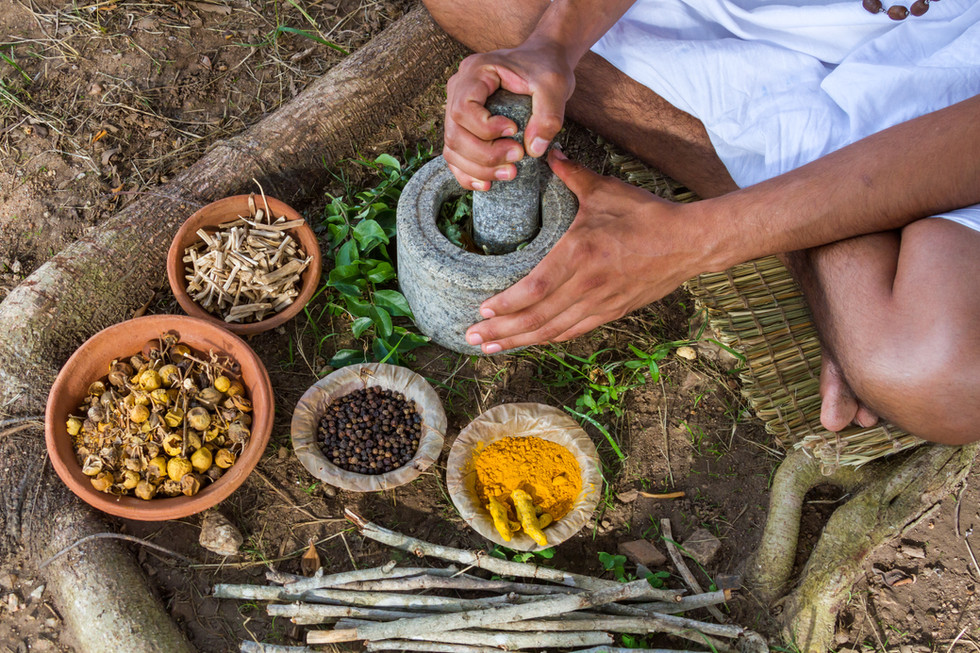Nature Is Our Pharmacy: Rediscovering the Healing Power of the Earth”Why the Future of Medicine May Lie in Our Past
- Dr Rakesh VG
- Jun 25, 2025
- 3 min read
Updated: Jun 28, 2025
By Dr Rakesh Ayureshmi. Ayureshmi Ayurveda wellness centre, Kollam, Kerala, India

What if your kitchen was more powerful than your medicine cabinet? Discover how ancient healing meets modern science because Nature is not alternative. It’s original.
The Forest Holds More Medicine Than the Pharmacy
What if the cure for chronic pain, depression, or even cancer wasn’t found in a pill bottle—but under your feet, in your kitchen, or growing in the forest nearby? As modern healthcare grapples with rising chronic diseases, resistant infections, and side effects of synthetic drugs, more scientists, doctors, and patients are turning back to nature—not as folklore, but as a frontier. Nature’s pharmacy is not a myth. It is medicine, backed by centuries of use and modern evidence.
The Green Revolution: Why Now Is the Time to Reclaim Nature’s Healing Power
In a world of rapid urbanization, antibiotic overuse, and synthetic overload, we are witnessing a silent epidemic of chronic inflammation, stress disorders, and lifestyle-related diseases. According to the World Health Organization, over 80% of the global population relies on traditional medicine, particularly herbs, as part of their primary health care. Yet many in the West are only just rediscovering what ancient systems like Ayurveda, Traditional Chinese Medicine, and indigenous healing practices have known for millennia: nature provides everything we need to heal—if we only listen.
Plants Know What We Forget: Wisdom Encoded in Leaves, Roots, and Bark
Every plant is a chemical factory. Neem, revered as “Sarva Roga Nivarini” in Ayurveda, contains over 140 biologically active compounds, including powerful anti-inflammatory and antifungal agents (Subapriya et al., 2005).
Turmeric (Curcuma longa) isn’t just a culinary spice; curcumin, its key compound, has shown potent effects in reducing inflammation, improving brain function, and potentially combating cancer (Aggarwal et al., 2007; Goel et al., 2008).
Even modern pharmaceuticals admit their roots:
Aspirin comes from willow bark
Metformin (a diabetes drug) evolved from the French lilac
Vincristine, a chemotherapy agent, is derived from Madagascar periwinkle
Yet we continue to isolate molecules instead of understanding the whole plant’s synergy.
Ayurveda: The Original Personalized Nature-Based Pharmacy
Unlike one-size-fits-all medicine, Ayurveda—India’s 5,000-year-old system—views every person as a unique blend of Vata, Pitta, and Kapha. Healing isn’t just about treating symptoms; it’s about restoring Prakriti (your natural balance).
Ashwagandha, for example, isn’t simply an adaptogen. In Vata types, it grounds anxiety. In Pitta, it cools aggression. In Kapha, it stimulates metabolism. This is precision medicine born from nature.
A 2013 study published in the Journal of Alternative and Complementary Medicine confirmed Ashwagandha’s efficacy in reducing cortisol levels and improving stress resilience—something synthetic anxiolytics often fail to do without side effects.
Science Catches Up: Herbal Medicine in the Era of Evidence
Today’s herbal renaissance isn’t just driven by tradition, but by rigorous science.
A 2019 meta-analysis in Phytotherapy Research confirmed that standardized ginkgo biloba improves cognitive function in dementia patients.
Holy Basil (Tulsi) is proven to regulate blood sugar and protect the liver (Jamshidi & Cohen, 2017).
Even cannabis, once vilified, is being explored for epilepsy, PTSD, and cancer-related pain, proving the value of re-evaluating traditional herbs through a modern lens.
What’s more, plants often contain multiple compounds that work synergistically, unlike synthetic drugs that may address one pathway but disrupt another.
The Future of Medicine Is Rooted in the Earth
As we enter an era of integrative and functional medicine, the role of herbs, whole foods, and natural therapies will only grow. Countries like India, Germany, and China are already integrating botanical medicine into mainstream care. Even Harvard and Stanford now include courses on plant-based healing and Ayurveda.
Nature is not an alternative—it’s the original. It is not anti-science—it is bio-intelligence refined over billions of years. By ignoring it, we lose not just a pharmacy, but a philosophy of healing that emphasizes harmony, sustainability, and inner wisdom.
Conclusion: Time to Reclaim the Medicine Growing Around Us
The next breakthrough in medicine may not come from a lab—but from a leaf, a root, or a flower you've walked past a hundred times. In a world disconnected from nature, reconnecting with Earth is the ultimate healing act—not just for our bodies, but for our souls and our planet.
So next time you're unwell, before you reach for another synthetic fix, ask yourself: What would nature offer me?
#NatureIsOurPharmacy Dr Rakesh Ayureshmi. Ayureshmi Ayurveda wellness centre, Kollam, Kerala, India





Comments